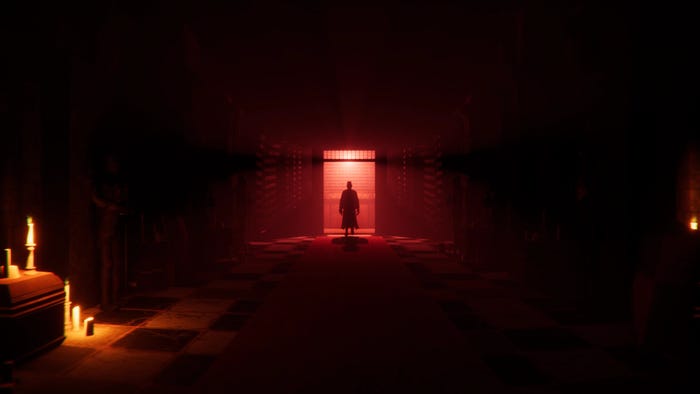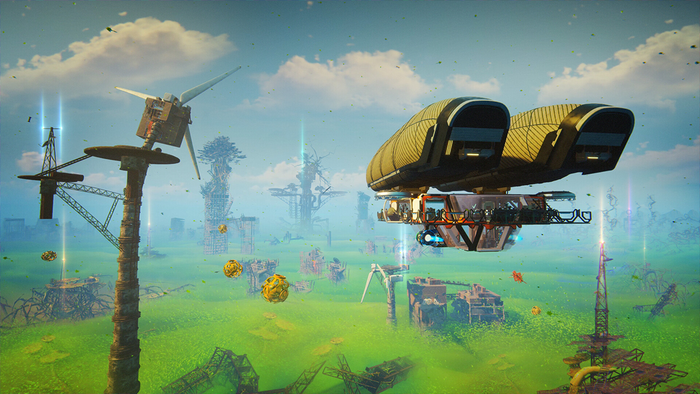Gamasutra news director Leigh Alexander peels back the lid on an industry built around play -- finding problematic toxicity and unhappiness in the games business, from developers through media to audience.

[Gamasutra news director Leigh Alexander peels back the lid on an industry built around play, and finds problematic toxicity and unhappiness in the games business, from developers to media to the audience they both serve.] "So you just get to play video games all day?" You’ve probably heard that one before, whether you’re a developer or a member of the games media. And you got pretty annoyed, or at least you did after the fifth or sixth time someone said so. Not only is it a bit frustrating that your career seems so inexplicable to so many people, but we take our work pretty seriously, and resent having it distilled down to a pointless pursuit by some common cohort that still correlates the game industry with bleeping asteroid-blasting (and there still exists a frustrating volume of those buggers, doesn’t there?) . Drill down past the surface irritation at being misunderstood, though, and find a little latent resentment. Just about anyone who’s longed for a career in their favorite medium has gone through it – the crucial phase wherein the luster’s buffed off and you realize that this biz is a lot of goddamned work. No, the awesome mascot-based space platformer you cheerily sketched on graph paper when you were supposed to be focused on math homework is not going straight to production. No, in fact, there are not a million page views at the ready for your exhaustive essay on the themes of Silent Hill 2. You will probably enter the biz doing, as the grim adage goes, bug testing for a Dora the Explorer tie in; you will probably enter games journalism blogging on UberGam3rzHell dot com for free, glad when you get one comment that says "tl;dr" because at least it means someone clicked on your headline. Okay, so maybe it’s not always quite that extreme, but the fact is that the game industry is actually quite a deceptively-stressful place, and fresh-faced younguns with dreams of "playing video games all day" are in for it. And there are some difficulties that are not exaggerations: unfortunately, there are major-title studios where an 80-hour week isn’t a melodramatic legend, but a light schedule. And when that game ships? A sea of arbitrary, tepid reviews from an apparently-jaded reviews corps, and endless forum threads stuffed with one-liners from an audience comfortable contributing only "failget" to the discussion. Some game journalists work their asses off for little pay, begging for scraps of interview access from a looming wall of corporate marketing, only to receive snide lectures from bloggers on how they’re not "real" journalists, to be privy to swaths of peanut-gallery essays about how they’re not "real" writers. Writers, reviewers and critics of all stripes cope with being made largely-lambasted "personalities" by a consumer base that often seems more interested in the writers than they do about the work being done in the field the writers cover. The Audience Of course, the common stressor that developers and journalists together face is the video game consumer, primarily the core gamer. But the audience has a bone to pick, too – they’ve been promised revolution and given merely low-risk iteration. They watch helplessly while the industry seeks new ways to monetize them, casualizes their beloved properties so that a disinterested "everyone" can play (whether a game whose audience is as specific and passionate as StarCraft II’s needs to worry about "accessibility" is a fair question for the traditional audience to ask, for example). User policies are implemented without too much apparent regard for enormous swaths of feedback, and gamers are consistently told by a more mainstream culture that their hobby is irrelevant, cannibalized in big gulps by Facebook and iPhone. In this vicious cycle, where each of three parties continually fails to satisfy the others on which it most crucially depends, it’s easy to see the seeds of bitterness sown – angry developers lash out at one another in the public forum, fatigued of rivalries or disillusioned by the likelihood that they will be jettisoned from their home base like so much depleted material when their project doesn’t make targets. Games media resents and condescends to its audience, and in many cases even develops aggressive vendettas against aspects of the industry it feels make appropriate targets. And the consumer seems terminally unhappy with them both. "Playing all day" is what brought us all together; the liberal joy of interactive entertainment is why we’re all here. Which is why it’s so strange to be asking this question: Is the games industry really a happy place? Problems In Developer Culture "A lot of game developers have an ‘are you man enough to run with us’ attitude," one anonymous veteran developer tells Gamasutra. "It’s like a wolf pack or a gang or something. Instead of taking the time to get everyone working in a team together, it's ‘see if he can survive our harsh environment’." So few people in the industry had a smooth or comfortable transition into their work, they become invested in making sure the "proving ground" is tough for others, too. It's easy to blame others for failures in "dog-eat-dog" type working conditions, the developer continues: "Game developers are trained to think competitively -- partially because of the assumptions of games themselves, and partially because of the crowded job market -- there's tens of dozens of talented graduates who are willing to take the lower salary and all the crap just to be able to do what the established professionals are doing," he adds. This sort of hiring environment has to make the career culture in game development hostile more often than not. "I’m lucky enough to be at a company that really values developer happiness, but there are some shops that view non-senior developers as disposable assets," agrees Fred Zeleny, narrative designer at Big Huge Games. "They’ll work new employees until they burn out and then replace them with another fresh face who’s eager to prove themselves in the industry - working harder for less money." "This is one of the reasons for the industry’s high burnout and turnover rates, and it means the developers that work their way up at these studios are either the most determined or the most stubborn – but not necessarily the most creative or the most fulfilled," he adds. More and more developer sources I talked to suggested that fatigue, hostility, being at odds with one’s employer and questioning one’s career course is frighteningly common in the game industry. That being the case, it seems natural that elements like emotional detachment, anxiety and a lack of fulfillment make their way, even subtly, into the products the industry creates and into the ecosystem around the industry and its audience. "Because of the secrecy and competition, a lot of development teams end up having a siege mentality - batten down the hatches and refuse to come up for air until the game's done," says the anonymous developer. "Game development has a way of taking over your life, because there's always more that can be done to improve perceived quality. I've seen a lot of divorces in my time in the game industry. I feel like it's much greater than average, but I have no statistical evidence." The average end user might not have any idea how games are made, but they may, on some level, be reacting to a thread of unhappiness on the creator’s side when they respond with constant negativity or dissatisfaction. Or not. Games media and developers alike know that gamers couldn’t give a damn. Gamers and the Media They want big explosions and they wanted them yesterday. Give it to them simply and immediately and they complain it’s too shallow or slapshod; take your time and they whine it’s too slow and too overwrought. They are a distractible breed, easily confused, and thus the success of a title has less to do with how hard developers worked on it and more to do with how good marketing teams are at manipulating them. Core gamers are demanding, entitled, obnoxious, sexist forum trolls. Of course, that’s not entirely true, and it’s probably not even a small part of the picture. But it sure seems like a sufficient summary sometimes from the view of a games journalist, who’s tasked with navigating the gap between an unhappy developer culture and a consumer culture that seems equally toxic. "I thought I was talking to people who were like me," one of my colleagues said to me recently about the decision to do the work we do. "Like I could do my childhood friends a service somehow by going in this world we loved and bringing information back out. But sometimes it feels like I’m being attacked every day by commenters and I realize these people aren’t like me at all." Like it or not, though, consumer hostility points to important facts: the audience isn’t being served well by the products it buys or by the media tasked with addressing it. Just as many developers are thrown young and underqualified into a pressure cooker, so are many writers. The malleable nature of content on the internet means that no distinction’s ever been broadly and decisively drawn between a news site and a community site, between game reviews and game criticism, and there are incendiary, ignorant brats writing spew on blogs alongside the writers that are trying to do their best, and no one can tell the difference. "There are actually people out there who will make fun of you if you say you’re trying to do real journalism," says my colleague. "Yet these people get into E3 for free [on press badges] just like you and I do." The Evil Overlords It’d be great if you could point to the rusty link in this cyclical chain, the causal element that, if replaced or repaired, would create a happier, healthier ecosystem for the video game industry. Of course, all three parties – developers, gamers and consumers – can glance in the general direction of "up the ladder" to the industry’s investor-driven corporate side. It’s the Men In Suits, after all, who make the decision to treat their studio staff as expendable. They’re the ones who determine that it’s time to clamp their lips shut when the media wants information, who manipulate an often young and inexperienced press corps with shameless ease. They’re the ones who make the decisions to charge for incremental content, to gently nudge up the prices of console titles over the years based on what they think gamers will tolerate. A different anonymous developer – this isn’t an industry where people find it wise to put their names out there – describes having run into some fellow developers from Civ house Firaxis drinking at the bar one day during lunch. Noticing they "looked pretty tipsy", one of this developer’s coworkers went over to greet their colleagues and find out what they were celebrating. The response was "sorry, we can’t tell you" – assuming the team was at work on Civ 5, or maybe the X-Com reboot, the developer and his coworkers gave congratulations to the Firaxis developers, looking forward to seeing what they're working on. "As you can probably guess, when we got back from lunch, we learned that they were the folks that Firaxis had 'streamlined' out the door," the developer said. "So not only did that suck for our friends… we felt like heels for our misplaced congratulations. I just wish they had felt like they could tell us in person - I can only assume someone higher in the chain wanted the news to stay quiet for as long as possible." The culture of secrecy and opportunism was born at the top among the publishing execs – but even then, "blame our dark corporate overlords" is too simple and largely misplaced. Executives have a job to do, too. In fact, a CEO has only one: add value for shareholders. And as irrelevant as that objective seems at a glance to everyone else in the industry ecosystem, it’s actually crucial – unhappy gamers are jerks, unhappy games media are lazy and unprofessional, and unhappy developers make crappy games. But unhappy investors mean a company can’t survive. That’s probably why the indies seem so happy whenever you see them all together at GDC, and why one of the only things that seems to make them mad is if you tell them they’ll be working for Zynga someday. Nonetheless, "Independence and art is good and big corporate is bad" is a familiar (and arguably tired) adage in any context – and more importantly, if there is indeed a broad deep-running fault line of ill health in the game industry, it won’t help. Who knows what will? One thing’s for sure – nobody’s just playing games all day. But to start, those developers who are happy should be free to speak up and speak out about what's making their jobs work, so that others can learn. Happy writers should apply their energy to developing positively-toned dialogue with the community, so that the community, in turn, doesn't just speak up when it's pissed off.
About the Author(s)
You May Also Like









